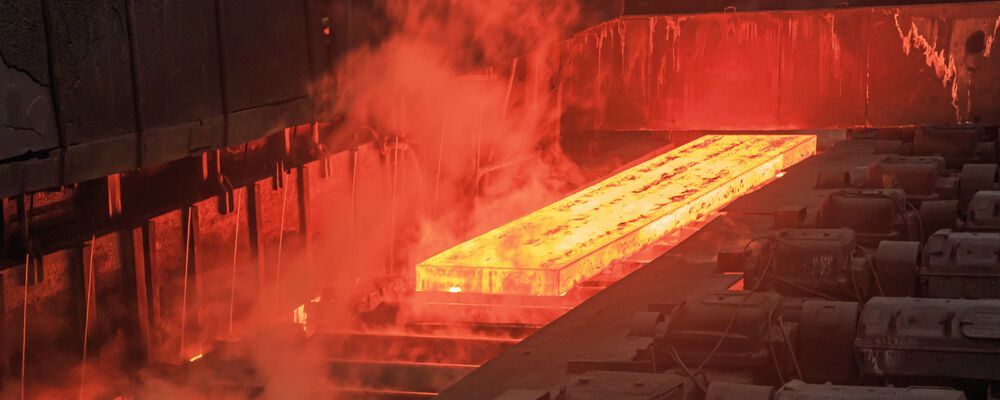The extreme environmental conditions in steel processing place high demands on the components used. Quick Flex elastomer couplings by Lovejoy, manufactured by R+L Hydraulics GmbH in Werdohl, Sauerland, are used in a steel plant operated by a well-known European steel and technology group. These couplings ensure torque transmission for the drive of roller conveyors in the hot rolling mill. The temperature-resistant couplings are low-wear and low-maintenance, helping to minimize downtime.
In steel processing, the liquid pig iron produced in the blast furnace is converted into crude steel in converters at the steel plant. The crude steel is then cast into long slabs, known as blooms, in continuous casting systems. These blooms are then rolled and formed into coils of flat or wire steel. For transporting the glowing blooms, which are about 10 meters long and weigh 25 tons, roller conveyors are used. Due to their high temperatures, the blooms must not come to a standstill, as this would damage the transporting rollers. The material must therefore be kept moving on the rollers until it has cooled or the next processing step begins.
Here, the reliability of the components plays a crucial role:
“If a coupling on the roller conveyor fails, it may be possible to continue operating until the next scheduled stop, but this carries the risk of damaging the roller,” says Detlef Peick, Business Development Manager for couplings at R+L Hydraulics in Werdohl. “This ultimately results in longer downtimes during later repairs or costs due to roller replacement. If the roller conveyor is taken out of operation, roller damage is avoided, but a bottleneck is created in the rest of the production line, as the subsequent system section cannot be used.”
To date, gear couplings are typically used in such applications. This type of coupling has excellent properties for accommodating shaft misalignments, which occur due to prevailing temperature fluctuations. At the same time, these couplings can reliably transmit high torques.
“However, gear couplings also have many disadvantages,” says Detlef Peick. “They require regular lubrication, and inspecting their condition involves laborious disassembly. If the coupling hubs or sleeve body need to be replaced, the gearbox and possibly even the electric motor must be removed before the components can be exchanged. All of this work takes time—time that can become very costly in such an application.”
This is where Quick Flex elastomer couplings come into play, offering torque transmission capabilities comparable to gear couplings. The design of the Quick Flex coupling, with opposing but non-interlocking teeth, avoids metal-to-metal contact and the resulting wear. At the same time, this design allows the elastomer element used for torque transmission between the teeth to be easily inserted from the outside. After loosening just a few screws, it can be inspected or replaced in no time. This is made possible by easily removable covers optimized for different applications, allowing easy access to the coupling.
“In this way, it is very easy to always keep a good overview of the condition of the couplings without having to shut down the system for extended periods,” says Detlef Peick. “Inventory requirements are also significantly reduced, as it is no longer necessary to stock complete couplings, only the much cheaper elastomer inserts. In the event of a failure despite the ease of inspection and maintenance, production can potentially continue without endangering the roller. A destroyed elastomer element interrupts the power flow, allowing the roller conveyor to continue operating. At the next opportunity, the elastomer part can be replaced in just a few minutes without moving the gearboxes or drives.”
Since the couplings do not require lubrication, regular oil checks and refills are also eliminated. The elastomer inserts of the Quick Flex couplings are available in three hardness levels and a high-temperature-resistant material. The temperature-stable material offers greater protection against overheating if a bloom remains on the roller conveyor longer than planned.
The Quick Flex series couplings were specifically designed for harsh operating conditions, meeting high demands while requiring only minimal maintenance. In addition to the steel processing application described here, the couplings are also suitable for use in mining, the oil and gas industry, as well as the food, pulp, and paper industries—anywhere extreme environmental conditions place the highest demands on components.
Categories
Less downtime in the hot rolling mill


